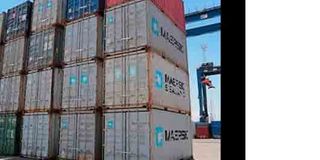Central Corridor performs badly in the first quarter of this year

What you need to know:
The corridor connects the Dar es Salaam Port with Rwanda, Burundi, Zambia and Democratic Republic of Congo.
Dar es Salaam. The Central Corridor’s container trade contracted by 12 per cent in the first quarter of 2017 despite overall growth in East Africa, a report has shown.
The corridor connects the Dar es Salaam Port with Rwanda, Burundi, Zambia and Democratic Republic of Congo.
However, trade through the northern corridor that links the Mombasa Port with Uganda, South Sudan and parts of Rwanda expanded by one per cent year-on-year, according to Steve Felder, managing director at Maersk Line Eastern Africa.
He says in the 2017 First Quarter East Africa Trade Report that aggregate trade levels in the region improved slightly since 2016.
“While conditions in the East Africa region have continued to be challenging due to political instability, ongoing macroeconomic headwinds and drought conditions affecting certain countries, we’re seeing healthy competition between the two corridors, both fighting for position in terms of some of the ‘swing’ countries that could export or import cargo through either corridor, specifically Rwanda, Burundi and Uganda.” The containerised market in the Central Corridor represents a different picture to that in the Northern Corridor, having contracted in both directions, says Mr Felder. “In the Tanzania market, there have been a number of duty increases on various products, such as cement, paper, sugar and furniture, which reduce the buying power and ultimately the levels of demand for those products. Part of this is to stimulate local industry, such as sugar production, but there is also a definite drive for increased tax collection in the country,” he says.
He added that while the export ban of mineral concentrates out of Tanzania has also had an impact on the mineral industries from DRC, Zambia and Rwanda, the Rwandan market appears to present a positive outlook.
Regarding the rest of the corridor, Mr Felder says political uncertainty and conflict continue to be a challenge.
However, Mr Felder is impressed by infrastructure development, especially the construction of standard gauge railways in Kenya and Tanzania.




